How to Get Published: It’s Not Just Your Writing
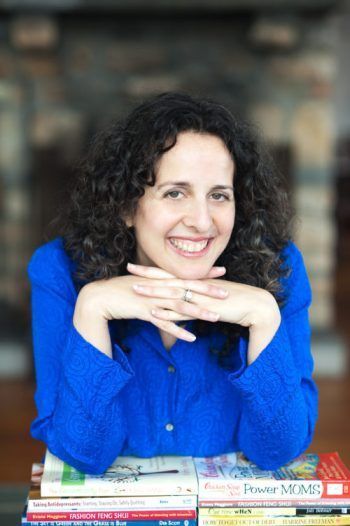
Two journalists friends make a common error.
I get at least two emails a week asking advice on how to get published. Yesterday, I spoke to a colleague who is a journalist, former publicist and former marketing professional and she made a mistake that I see made by at least 80% of aspiring authors.
All she’d done the past year on her book was write the book and then her book proposal.
Platform building: zilcho.
That’s actually a wonderful thing, because I know it means she poured her heart and soul into writing a great book.
But it was funny speaking with her, because she hadn’t even thought about all the PR and marketing she may need to do beforehand.
“Ha. I was thinking I’d do all those things when the book comes out, but it makes sense that publishers would want to see something more solid than a promise.”
Exactly.
So, my friend promised me to take all the brilliant things in her book promotion plan (from her book proposal) and implement most of it now, before approaching publishers. Then, we’ll talk!
She’s asking her son for help with Twitter, journalist friends for blurbs and commitments to spread the word and she promised me to return to her long-neglected blog.
[bctt tweet=”How to Get Beyond a Polite ‘No’ with Publishers ” username=”LisaTener”]
Today, I got another email asking for help with how to get published, this time from a relative who’s an award-winning writer. She just wrote a narrative nonfiction book-length manuscript and had it professionally edited.
Knowing the topic and her writing chops, I’m sure it’s laugh-out-loud funny and brilliant.
So, why is it so hard to get it published? She’s had only one bite out of 20 queries, and so wrote me for advice. That’s when I decided it was time for a post—one for my cousin and anyone interested in how to get published by a traditional publisher—whether you are writing narrative nonfiction (memoir, creative nonfiction, biography, etc.) or a self-help or how-to book.
First, one bite out of 20 queries is not all bad. That tells me there’s interest. As they say in the industry, “The book has legs.” However, I’m fairly confident she can take several steps to improve her chances and they all have to do with platform-building.
Build Your Platform to Make Your Book Attractive to Publishers and Literary Agents

If you read my posts regularly, I’m sure you know that platform means the ways you reach people—online and offline—with your message. And you may also know that building your platform is perhaps the most important ingredient in the “how to get published” formula.
Here are some quick and more long-term things you can do to develop the kind of following that publishers and agents are looking for, so your book can get picked up and published:
- Update Your Website: Recently, a few of my clients had fairly outdated websites. Before sending out their book proposals I advised them to update their sites for a fresh, professional, branded look, but also for all the things a publisher looks for—the things that help publishers get a clear picture of your platform and online reach. If you’re thinking of a website reboot. Check out my post on What to Put on an Author Website.
- Create and Grow a Mailing List: The people on your mailing list should be the people most likely to buy your book. The bigger this list, the more publishers and agents will think there are people ready to buy (not everyone, but certainly a percentage of those on your list). How do you grow your list? With people who are in your target market. Offer a “lead magnet” or “free offer” on your website that is so compelling that folks will be willing to share their first name and email with you.
-
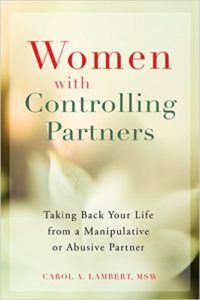
Carol Lambert’s publisher required a commitment to grow her social media presence before offering a contract. Connect on Social Media: You don’t have to be super-active on every platform. Pick one or two platforms where you’ll be most likely to find your target readers and get active there. Connect with readers but also those people who influence your readers—bloggers, other authors, tv and radio producers, journalists, etc. Share their great articles and shows, as well as your own.
- BLOG: Yes, blogging takes some time and focus but it is one of the best ways to connect with your peeps and develop a relationship. And this relationship isn’t just a one way communication where you spew out information, hoping people like it. Nuh-uh. You get to hear back from them and learn what they’re interested in when you invite comments on your blog. In addition, your blog will help Google and other search engines love you (and send visitors) as well.
- Speak: Publishers love to see a significant speaking schedule. It means that you regularly reach your target audience in an intimate way and a setting where they are likely to buy books.
-
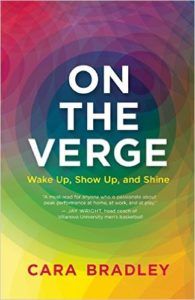
Cara Bradley grew her mailing list by 50%, hired a publicist and began blogging on the Huffington Post in order to make her platform appealing to publishers. Teach: Seminars, especially through organizations and companies offer a similar excellent opportunity for book sales. In fact, many author/trainers factor book sales into all their corporate trainings. This helps boost book sales and also make sure that participants have a nice takeaway they can use to remember what they learned, dive deeper and share with others. You can teach in person or remotely.
- Network: One of my most successful sales strategies has been to identify people who offer excellent programs that my people (authors and aspiring authors) need and which I do not offer. In my case, these are services like book marketing, business marketing and business building. Many times, these people offer affiliate programs and I get a percentage of sales I have generated (of course, it’s important to be up front with your community when you are receiving commissions). Most often, your affiliate partners or JV partners will be happy to promote your services and book in return.
I will say, strategy 7 is one to be careful about. You want to do your due diligence, research all programs the best you can, speak to people who’ve participated or become a participant yourself. Monitor how your folks benefited from or liked the program afterwards. If they had a less than stellar experience, you can give the provider feedback, but err on the side of dropping a program rather than hoping the presenter will change. If an affiliate program could be considered a conflict of interest in certain cases, make sure you don’t receive a commission for those clients.
Use Sustainable Strategies to Grow Your Platform and Get Published
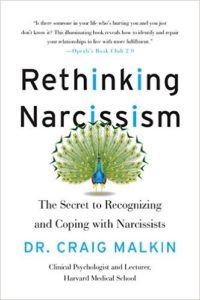
I use the word “Sustainability” often when speaking about platform building. There is nothing more frustrating than throwing money into social media, website, PR and hoping that a big advance or stellar book sales will pay back more than your investment.
The more you have income-producing opportunities already in place, the more any of your efforts can be sustainable from the outset. Your platform building contributes to the bottom line and, in turn, those income producing activities will naturally also result in book sales. This model will make book marketing more enjoyable, less stressful and sustainable.
When I see clients without a sustainability element, they often give up quickly because the activities that can generate book sales end up costing more money than they generate. Even clients who have stuck with it and gotten great PR end up with modest book sales (if they don’t have the sustainability element) compared to those who operate from a sustainable model from the outset.
Of course, these platform building strategies are meaningless without a solid book concept that speaks to a real need within a clear, significant target market and a well written book (or sample chapters). And you’ll want to go through the expected steps to write a book proposal as well. And be sure to download my free report: 10 Tips to a Book Proposal Publishers Will Love.
Be thorough and don’t rush these steps and you will increase your chance of getting your book published by a traditional publisher—and reaching lots of eager readers, as well.
Have any questions or a publishing story to share? Comment below.

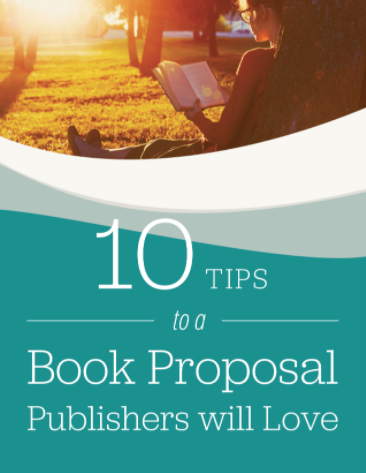


How do you finish one book while you’re waking up with new ideas? I have 5 books that I’m writing but I thought of a new book and am writing down ideas, recording parts of it and wake up jotting down scenarios.
My first book I have been working on for 3 years. Its almost done. I dove in and my fingers wouldnt stop! Now I’m to the middle (I already have the beginning and ending) and I’m stumped. I know what I want but the words won’t come.
My new book is screaming ideas at me every day, even while I’m at work.
I don’t want to not write down ideas as they come for my other books, but how do I quiet all the others and just finish one?
Hi Lisa,
This is a great question! I do encourage you to focus on finishing one book as you say you want to. Here are a few ideas since you say you are stumped:
1. If you’re stuck on one part, move on and write the next part and come back to this part later.
2. Or try this guided visualization for writers and ask your “muse” – your inner creative genius – what comes next or how to get unstuck.
3. Maybe it’s time to ask an editor for support and get input. It sounds like your book is fiction; is that right? If so, I can refer you to a colleague who specializes in fiction.
I agree that it can be overwhelming to continue to get ideas for all the books. Can you prioritize them and only write down ideas for the top 2 or 3? Or can you write an intention statement for yourself (or a letter to your muse) that you read daily that states what you intend for your books and what you want from your muse, including that you want to focus on completing one book at a time?
It is challenging enough to write one book at a time – especially hard if one is going to try to write several books at a time that are similar content. May not be as hard if one book is fiction and the other is a business book. Depends a lot on how experienced the writer is.
Good points, Tina!
Hi Lisa,
Thank you for responding.
Yes, you are correct that my books are fiction.
However, the latest one is fiction based on facts. (If that makes sense?)
I do have my top 2 that I work on. My problem is that I’m good at writing certain parts but other parts like fight scenes, etc (action parts) I’m not good at. That’s what stumps me. Parts that I have no idea where to begin. I know what I want and can see it in my mind but when I try to put it down into words, I can’t.
A letter to my muse is a wonderful idea. Maybe an intention statement also would help me?
I believe you’re right, it is time to start asking for support. I have been trying to do it all on my own but my books may never come to life without it.
Yes, you can call the fiction based on facts “creative nonfiction” if it’s close or just fiction–your choice.
For the action scenes, perhaps find some authors who do those scenes well and study them. What do they do that works? Are you envisioning the scenes in your mind as you write? Are you asking yourself what you smell, hear, touch, etc.? Email me if you’d like a referral to a fiction editor.
I’m sorry but im speaking from the prospective of a new Author. Traditional publishing houses won’t even look at new authors just starting out. I had to go throught a hybrid publisher to get my first book published and it cost me seven hundred dollars. getting your book published is not cheap or easy. Nor so you get rich quick. I’ve had to struggle to get my book out there. even now I cannot afford much in the way of publishing or promoting my book. I get calls almost daily with offers I cant afford even in my wildest dreams. Yet I plug away because I love to write. I’m not complaining I’ve gotten more in my writing career than ever dreamed of and I still dream of more. I am just discouraged with all the expenses being an author seems to come with. I just need advice on dealing with publishers, choosing the best deals, and when to say know. I’m afraind my dealings with publishers haven’t made very confident in any one particular type of publisher or my ability to work with them. I am currently working in a book for an ebook place known as Dreame.com because the most investment I needed is my time and to promote the book. I look forwar to hearing from you and appologize for the length of my reply.
Yes, be careful of all those offers you get from people trying to sell you book marketing services. Much of it is hype. Good luck with Dreame.com. Let me know how that goes.
Ideally, it’s best if there is a business plan behind the books so that not all the money comes from book sales (which tends to be a lot of work for little money). For example if you teach classes on the subject of your book, that’s additional income that the book can help support.